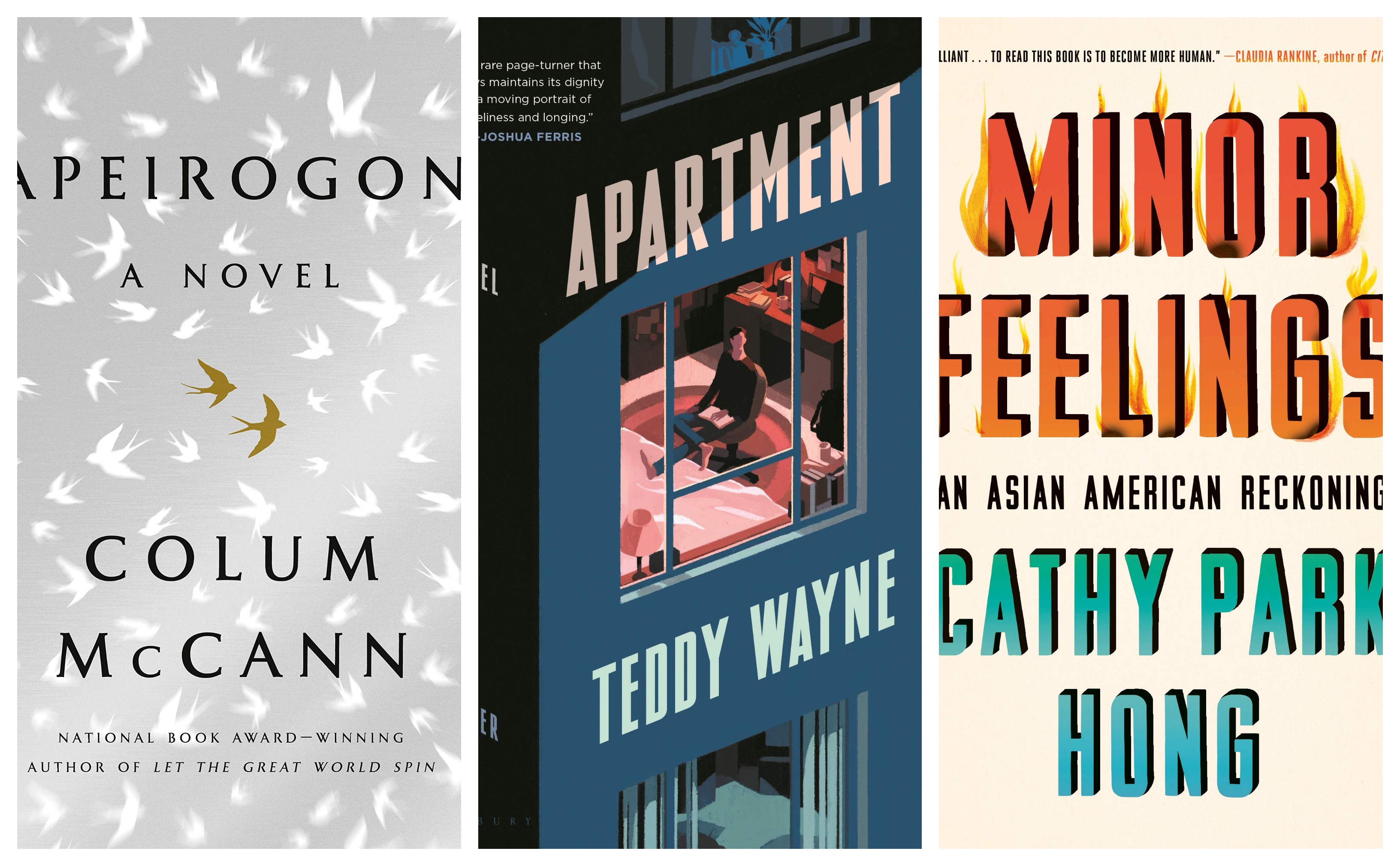Here’s a quick look at some notable books—new titles from the likes of Cathy Park Hong, Rachel Vorona Cote, Malcolm Harris, Colum McCann, and more—that are publishing this week.
Want to learn more about upcoming titles? Then go read our most recent book preview. Want to help The Millions keep churning out great books coverage? Then become a member today.
Minor Feelings by Cathy Park Hong
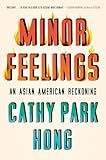 Here’s what Publishers Weekly had to say about Minor Feelings: “In this blistering essay collection, poet Hong (Engine Empire) interrogates America’s racial categories to explore the ‘under-reported’ Asian-American experience. Hong, a child of Korean immigrants, was born in Los Angeles’s Koreatown, but moved from the neighborhood before the 1992 riots upended the area. Her topics include personal experiences, from learning English as a second language and obsessing over her scented Hello Kitty–branded erasers as a child, to mining the repertoire of Richard Pryor as a young woman entering the stand-up scene. She is both angry and wryly funny when examining her struggles with depression, hemifacial spasm disorder, and poetry peers who dismissed her first book as ‘hack identity politics.’ Assessing perceptions of Asian-Americans as ‘next in line to be white,’ as one man tells her, she observes that in fact they have the ‘highest income disparity out of any racial group’ in the country. Her confrontational prose maintains a poet’s lyricism in ‘The End of White Innocence,’ which recalls a childhood ‘spent looking into the menagerie of white children.’ Combining cultural criticism and personal exploration, Hong constructs a trenchant examination of race in America.”
Here’s what Publishers Weekly had to say about Minor Feelings: “In this blistering essay collection, poet Hong (Engine Empire) interrogates America’s racial categories to explore the ‘under-reported’ Asian-American experience. Hong, a child of Korean immigrants, was born in Los Angeles’s Koreatown, but moved from the neighborhood before the 1992 riots upended the area. Her topics include personal experiences, from learning English as a second language and obsessing over her scented Hello Kitty–branded erasers as a child, to mining the repertoire of Richard Pryor as a young woman entering the stand-up scene. She is both angry and wryly funny when examining her struggles with depression, hemifacial spasm disorder, and poetry peers who dismissed her first book as ‘hack identity politics.’ Assessing perceptions of Asian-Americans as ‘next in line to be white,’ as one man tells her, she observes that in fact they have the ‘highest income disparity out of any racial group’ in the country. Her confrontational prose maintains a poet’s lyricism in ‘The End of White Innocence,’ which recalls a childhood ‘spent looking into the menagerie of white children.’ Combining cultural criticism and personal exploration, Hong constructs a trenchant examination of race in America.”
Too Much by Rachel Vorona Cote
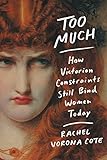 Here’s what Publishers Weekly had to say about Too Much: “Cote, a former PhD candidate in Victorian literature at the University of Maryland, traces the ‘unspoken rules’ that govern the expression of women’s emotional and physical desires to 19th-century medicine and culture in this vigorous, wide-ranging debut. Noting that ‘hysteria’ was a widespread medical diagnosis given to Victorian women exhibiting all kinds of ‘inappropriate’ behavior, from sighing and sudden laughter to self-mutilation, Cote analyzes how writers including Elizabeth Gaskell, Christina Rossetti, and the Brontë sisters ‘contemplate[d] the circumstances of women in an age when emotion was so viciously policed and pathologized.’ In chapters devoted to mental health, infidelity, body image, ageism, and sexual desire, Cote confesses to her own ‘alluvion of feeling’ and relates personal experiences, including a suicide attempt and the end of her first marriage, to characters and plots in Victorian literature and figures from modern popular culture, including Britney Spears, Lana Del Rey, and ‘Stifler’s Mom’ in the movie American Pie. She conclusively shows that women have been ’emotionally trussed for centuries,’ and empowers her readers to embrace their ‘too muchness’ as an ‘agent of emotional integrity.’ Though Cote’s blend of memoir, criticism, and history sometimes feels unfocused and idiosyncratic, her overarching arguments are apt. Readers whose tastes run from George Eliot to Lorde will embrace the book’s feminist message.”
Here’s what Publishers Weekly had to say about Too Much: “Cote, a former PhD candidate in Victorian literature at the University of Maryland, traces the ‘unspoken rules’ that govern the expression of women’s emotional and physical desires to 19th-century medicine and culture in this vigorous, wide-ranging debut. Noting that ‘hysteria’ was a widespread medical diagnosis given to Victorian women exhibiting all kinds of ‘inappropriate’ behavior, from sighing and sudden laughter to self-mutilation, Cote analyzes how writers including Elizabeth Gaskell, Christina Rossetti, and the Brontë sisters ‘contemplate[d] the circumstances of women in an age when emotion was so viciously policed and pathologized.’ In chapters devoted to mental health, infidelity, body image, ageism, and sexual desire, Cote confesses to her own ‘alluvion of feeling’ and relates personal experiences, including a suicide attempt and the end of her first marriage, to characters and plots in Victorian literature and figures from modern popular culture, including Britney Spears, Lana Del Rey, and ‘Stifler’s Mom’ in the movie American Pie. She conclusively shows that women have been ’emotionally trussed for centuries,’ and empowers her readers to embrace their ‘too muchness’ as an ‘agent of emotional integrity.’ Though Cote’s blend of memoir, criticism, and history sometimes feels unfocused and idiosyncratic, her overarching arguments are apt. Readers whose tastes run from George Eliot to Lorde will embrace the book’s feminist message.”
Apartment by Teddy Wayne
 Here’s what Publishers Weekly had to say about Apartment: “Wayne’s subtle, fascinating novel (after Loner) is set in the world of an MFA creative writing program at Columbia in 1996. The anxious, unnamed narrator didn’t make any friends at New York University as an undergraduate, and considers it equally unlikely that he will find any among the ambitious, self-assured students in his current classes. He’s delighted when charismatic Midwestern scholarship student Billy defends the first story the narrator presents against the attacks of the class, and invites Billy, who has been living in the basement of the bar where he works, to share the two-bedroom apartment the narrator’s great-aunt has been allowing him to live in rent-free. Billy offers to clean the apartment and cook dinners in exchange for the room. At first, the narrator revels in the arrangement, but the balance of power between the two shifts gradually but irrevocably over the months that follow. The narrator, inclined to ‘airbrush out unpalatable blemishes here and there’ in his past and his emotional life, notices and then immediately represses things like the way ‘the thin ribbed cotton of his white tank top hugged [Billy’s] body like a second skin.’ Wayne keeps his attention firmly on the small details that define the evolving relationship as Billy loses interest in the narrator. Wayne excels at creating a narrator both observant of his surroundings and deluded about his own feelings. Underneath the straightforward story, readers will find a careful meditation on class and power.”
Here’s what Publishers Weekly had to say about Apartment: “Wayne’s subtle, fascinating novel (after Loner) is set in the world of an MFA creative writing program at Columbia in 1996. The anxious, unnamed narrator didn’t make any friends at New York University as an undergraduate, and considers it equally unlikely that he will find any among the ambitious, self-assured students in his current classes. He’s delighted when charismatic Midwestern scholarship student Billy defends the first story the narrator presents against the attacks of the class, and invites Billy, who has been living in the basement of the bar where he works, to share the two-bedroom apartment the narrator’s great-aunt has been allowing him to live in rent-free. Billy offers to clean the apartment and cook dinners in exchange for the room. At first, the narrator revels in the arrangement, but the balance of power between the two shifts gradually but irrevocably over the months that follow. The narrator, inclined to ‘airbrush out unpalatable blemishes here and there’ in his past and his emotional life, notices and then immediately represses things like the way ‘the thin ribbed cotton of his white tank top hugged [Billy’s] body like a second skin.’ Wayne keeps his attention firmly on the small details that define the evolving relationship as Billy loses interest in the narrator. Wayne excels at creating a narrator both observant of his surroundings and deluded about his own feelings. Underneath the straightforward story, readers will find a careful meditation on class and power.”
The Splendid and the Vile by Erik Larson
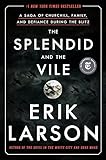 Here’s what Publishers Weekly had to say about The Splendid and the Vile: “Larson (Dead Wake) delivers a propulsive, character-driven account of Winston Churchill’s first year as British prime minister (May 1940–May 1941), when the German air force launched ‘a full-on assault against the city of London’ in preparation for an invasion that never came. Larson’s profile subjects include Churchill’s 17-year-old daughter, Mary; his private secretary, John ‘Jock’ Colville, who kept a meticulous (and likely illegal, due to the national security secrets it revealed) diary; Nazi leader Rudolf Hess; and, to a lesser extent, ordinary Britons. Juxtaposing monumental developments, such as the Dunkirk evacuation, with intimate scenes, Larson notes that on the night Churchill learned French leaders wanted to make peace with Hitler, he raised his dinner guests’ spirits by passing out cigars, reading aloud telegrams of support from other countries, and ‘chant[ing] the refrain from a popular song.’ Larson highlights little-known but intriguing figures, including chief science adviser Frederick Lindemann, who made a multifaceted but unsuccessful case for why tea shouldn’t be rationed, and documents the carnage caused by German bombs, including the deaths of 34 people at the Café de Paris shortly before Mary Churchill was set to arrive at the club. While the story of Churchill’s premiership and the Blitz have been told in greater historical depth, they’ve rarely been rendered so vividly. Readers will rejoice.”
Here’s what Publishers Weekly had to say about The Splendid and the Vile: “Larson (Dead Wake) delivers a propulsive, character-driven account of Winston Churchill’s first year as British prime minister (May 1940–May 1941), when the German air force launched ‘a full-on assault against the city of London’ in preparation for an invasion that never came. Larson’s profile subjects include Churchill’s 17-year-old daughter, Mary; his private secretary, John ‘Jock’ Colville, who kept a meticulous (and likely illegal, due to the national security secrets it revealed) diary; Nazi leader Rudolf Hess; and, to a lesser extent, ordinary Britons. Juxtaposing monumental developments, such as the Dunkirk evacuation, with intimate scenes, Larson notes that on the night Churchill learned French leaders wanted to make peace with Hitler, he raised his dinner guests’ spirits by passing out cigars, reading aloud telegrams of support from other countries, and ‘chant[ing] the refrain from a popular song.’ Larson highlights little-known but intriguing figures, including chief science adviser Frederick Lindemann, who made a multifaceted but unsuccessful case for why tea shouldn’t be rationed, and documents the carnage caused by German bombs, including the deaths of 34 people at the Café de Paris shortly before Mary Churchill was set to arrive at the club. While the story of Churchill’s premiership and the Blitz have been told in greater historical depth, they’ve rarely been rendered so vividly. Readers will rejoice.”
Apeirogon by Colum McCann
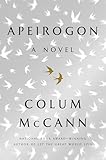 Here’s what Publishers Weekly had to say about Apeirogon: “National Book Award–winner McCann (Let the Great World Spin) bases this masterful novel on the lives of two real men working together toward Middle Eastern peace. Rami Elhanan, 67 on the single day of 2016 on which the main narrative takes place, is a graphic designer and Israeli military veteran. In September 1997, his 13-year-old daughter, Smadar, was killed in a Jerusalem suicide bombing. His need for revenge fades when he joins the Parents’ Circle, whose members, of many nationalities and religions, have all lost a child in the Israel/Palestine conflict. Nineteen years younger than Elhanan, Palestinian Bassam Aramin is jailed in 1985, at 17, for resisting the Israeli occupiers in Hebron, where he’s raised. During his imprisonment, writings by Gandhi, among others, and friendship with one of the Israeli guards convince him of the power of nonviolence. Released after seven years, he helps found Combatants for Peace, which brings Palestinian and Israeli fighters—among them Elhanan’s son, who introduces the two men—together for dialogue. The fatal 2005 shooting of Bassam’s 10-year-old daughter, Abir, by an Israeli border guard doesn’t shake his belief that Israelis and Palestinians share ‘an equity of pain’; he and Elhanan begin meeting daily, using their daughters’ stories to become international advocates for peace. The book’s title is a reference to a polygon with a countable but infinite number of sides, and McCann evokes the experience of its protagonists and their region through 1,001 brief numbered segments that incorporate sequences in the men’s own voices and interconnect topics including bullet manufacturing, Jorge Luis Borges, and birds. Balancing its dazzling intellectual breadth with moments of searing intimacy, this is a transformative vision of a historic conflict and a triumph of the novelist’s art.”
Here’s what Publishers Weekly had to say about Apeirogon: “National Book Award–winner McCann (Let the Great World Spin) bases this masterful novel on the lives of two real men working together toward Middle Eastern peace. Rami Elhanan, 67 on the single day of 2016 on which the main narrative takes place, is a graphic designer and Israeli military veteran. In September 1997, his 13-year-old daughter, Smadar, was killed in a Jerusalem suicide bombing. His need for revenge fades when he joins the Parents’ Circle, whose members, of many nationalities and religions, have all lost a child in the Israel/Palestine conflict. Nineteen years younger than Elhanan, Palestinian Bassam Aramin is jailed in 1985, at 17, for resisting the Israeli occupiers in Hebron, where he’s raised. During his imprisonment, writings by Gandhi, among others, and friendship with one of the Israeli guards convince him of the power of nonviolence. Released after seven years, he helps found Combatants for Peace, which brings Palestinian and Israeli fighters—among them Elhanan’s son, who introduces the two men—together for dialogue. The fatal 2005 shooting of Bassam’s 10-year-old daughter, Abir, by an Israeli border guard doesn’t shake his belief that Israelis and Palestinians share ‘an equity of pain’; he and Elhanan begin meeting daily, using their daughters’ stories to become international advocates for peace. The book’s title is a reference to a polygon with a countable but infinite number of sides, and McCann evokes the experience of its protagonists and their region through 1,001 brief numbered segments that incorporate sequences in the men’s own voices and interconnect topics including bullet manufacturing, Jorge Luis Borges, and birds. Balancing its dazzling intellectual breadth with moments of searing intimacy, this is a transformative vision of a historic conflict and a triumph of the novelist’s art.”
Also on shelves: Shit Is Fucked Up and Bullshit by Malcolm Harris.
Bonus Links from Our Archive:
— Only the Lonely: The Millions Interviews Teddy Wayne
— A Year in Reading: Teddy Wayne
— A Review of ‘The Devil in the White City’ by Erik Larsen
— Guns and Testosterone Rule the World: An Interview with Colum McCann
— The Real and the Imagined: On Colum McCann’s ‘TransAtlantic’
— A Year in Reading: Colum McCann
